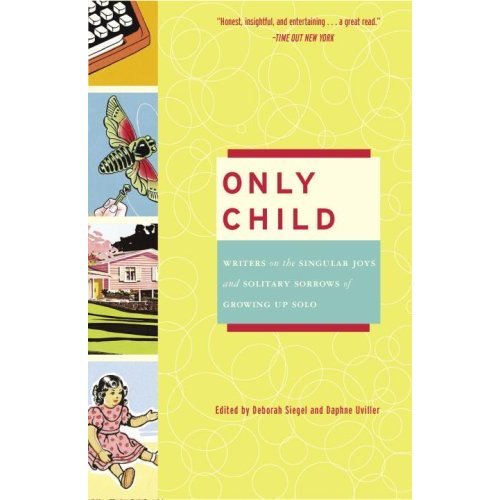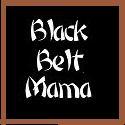April 7, 2008
Only Child
Raw. Poignant. Emotional. Humorous. Honest. As readers, we all bring our own baggage with us to every book we read. Like art, our reading experience is just that-an experience. When asked to review Only Child: Writers on the Singular Joys and Solitary Sorrows of Growing Up Solo, I brought my own baggage with me. I’m not an avid non-fiction reader, not because I don’t enjoy it, but instead, as an English teacher, when I am not reading for my classes, I want to escape into a book-not have to think. However, Only Child was a book I wanted and needed to read, and every night I allowed myself 20 minutes no matter how late it was to fall into this honest look at only child-dom put together by editors Deborah Siegel and Daphne Uviller.
You see, I never expected to raise an only child. I am one of two children who always had dreams of a loud, raucous, large family reminiscent of the Cheaper by the Dozen crew. My husband is one of seven and certainly wanted to recreate that. When we were first dating, we’d have the "How many kids do you want to have" talk-he said five, I said, "We’ll see after the first one." Looking back, I feel like I cursed us. It was extremely difficult to have our son, and now, almost four years later, we are faced with an almost certain finished family. Infertility has robbed us of the family we wanted not just for us, but also for our son. He grows up alone, no partners in crime, no built in friend. Only Child explores these issues, from the parent point-of-view, from the only child, and from the only child as parent point-of-view.
What struck me the most as I read this was how raw and emotional it was. Each essay delved into a different aspect of what it was like to be an only child. Each writer was more honest than I imagine most people can be. At times, without even realizing it, I found myself sobbing. It’s not that the plight of the only child is a bad one, because many of these essays showed just how great it can be, but all of the essays did demonstrate some similar themes, the biggest one being, "What happens when I am all that is left?" This haunts me as a mother of an only child. What will my son do when we are gone? Who will be there to support him? Will he be lonely? Who will be there to help him tell the stories of our family? I read this book to find those answers and find comfort in a life I didn’t choose. Sometimes, Only Child provided that for me, other times, it hurt to read the words of the "lonely child."
What strengthened me after reading this was that, for the most part, only children feel incredibly loved. Most of them talked about this bond they have with their parents. John Hodgman, in his essay "A Letter to My Second Child," discussed the family of three as "stable as a triangle, unlikely to collapse, each point strengthening and relying on the other" (158). I like this concept, this idea of stability that I hopefully will provide for my son. Together, we will take on the world. Hopefully, along the way, I will teach him how to play well with others so that he might find some stability in other relationships. The idea of him being all alone tears me up inside, but I have to trust that what these only children tell me is the truth: that they are very well loved, very stable, and while sometimes envious of sibling relationships, they always are grateful for the life they have been given.
For the depth of honesty shown in the book, for giving a voice to this mysterious group called "onlies," for giving comfort to a mother desperately seeking happiness for her only child, I give this a:
![]()


















I think the most important thing your review does is also remind people that family size is not always a choice. Thank you for writing this.
As a 43 yo “lonely child” as I always called myself, I can tell you first hand, if there were one thing I could change about my life, this would be it. I am very close with my parents – too much so I think sometimes. They are both elderly and I know they will not be around too much longer (I tear up just thinking of it)because like you said the book said, after they are gone, I’m it. There will be no one to feel how I feel. No one who will have experienced alot of my childhood with me. I have a cousin with whom I’m very close and she pretty much lived with us when we were young so that helps, but she has her own siblings, as do all my friends. I’ve never been the maid of honor…that always went to my best friend’s sisters. I’ll never be a true blood related aunt. (We dont’ associate w/my husband’s family but we won’t go into that. 🙂 One of the few advantages of being a “lonely child” was the fact that I was used to spending time alone and am comfortable doing so. I like my own company. My husband, one of 5 kids,and my daughter, one of 2 (I swore I’d never let my child be an only like me and let me tell you, I had to go through fertility stuff like crazy to make that happen and it finally did – 8 years after my oldest!), and my parents, each of 7 siblings, none of them understand that I need time to be alone and just think. If you have a choice, have a 2nd child. If you can’t, try to foster close relationships with a cousin or someone near the same age so they will have someone like my cousin, who is as close to a sister as I will ever get.
Mel-Thanks. It was difficult at times to read, but it did offer me some comfort.
Lisa-Good to know that after 8 years, you did achieve the family of 4. So there is hope? Thanks for your comments and your “only child” view on this.